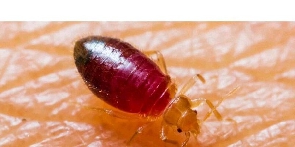Encasement removes hiding areas and makes it easier to spot bed bugs. This helps prevent infestations of new mattresses.
Traps
Moat-style traps may be used to isolate the bed and intercept bed bugs between their hiding places and their journey to bite the host.
Sticky pads under the legs of the bed can catch bugs, but they can be messy.
Such “interceptor” devices are available for purchase online, but they can also be made at home.
Scientists from the University of Florida have produced the following video, available on YouTube, explaining how to create homemade moat traps.
Pulling the bed away from the walls and ensuring that bed linen does not touch the floor helps to make the bed an island.
Heat
Laundering in hot water is an effective way of killing bed bugs on fabrics.
Bed bugs die when their body temperature is over 45° CelsiusTrusted Source or 113° Fahrenheit. Exposing the bugs for an hour to temperatures higher than these can kill all stages. At temperatures over 60°C (140°F), all bed bugs are killed rapidly.
Heating a room is unlikely to work, because of the high temperatures needed. It may also spread an infestation, because bed bugs will seek the cooler areas in the room, beyond the reach of the heat.
Cold
Bed bugs can be killed by cold temperatures, but it requires temperatures below -18°C (0°F) for at least 4 days in order for the cold to penetrate an object and kill all the bugs and eggs.
Smaller items that may contain bed bugs can be put in a suitably cold freezer and the 4-day period should be counted from when the center of the object reaches -18°C (0°F). This takes longer for bulkier objects.
However, the EPA notes that home freezers may not be cold enough to kill bugs, and it can take a long time for this to work.
Gas systems designed for instant freezing are ineffective and may spread an infestation, as the high air pressure can blow the bugs away.
Turning off the heating and leaving windows and doors open is not an effective strategy. The temperature is unlikely to be cool enough.
Leaving a room empty for more than a year can be effectiveTrusted Source for killing bed bugs as this deprives them of sustenance. They may, however, migrate to a nearby property and return later.
Chemicals for home use
Some chemicals are available for purchase online or from hardware stores. These can be hazardous when used indoors.
It is important always to use an approved product and to follow the instructions with care.
These include:
pyrethrins and pyrethroids, derived from chrysanthemum flowers
desiccants, such as boric acid and diatomaceous earth, which dry out the protective coating on bugs
biochemicals, specifically cold-pressed neem oil
pyrroles, of which chlorfenapyr is the only registered product in the U.S.
neonicotinoids, a synthetic form of nicotine that affects the bugs’ nervous system.
insect-growth regulators, which affect the growth process of bugs
make sure bed bugs are mentioned on the label
It is important to follow the instructions carefully when applying the products so that they make direct contact with the bed bugs.
“Bug bombs,” or total release foggers, are not considered effective. They are unlikely to reach the cracks where bugs hide, and they can be harmful to health. There is also a risk of explosion.
Some products, including those that contain pyrethroids, have a flushing effect. This could spread the infestation.
The Environmental Protection Agency (EPA) provides a search tool that can help you find a suitable registered product.
Health News of Saturday, 18 February 2023
Source: WAL.COM













